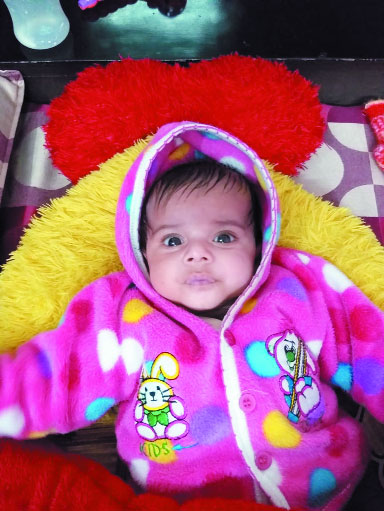The state-of-the-art technology and expertise of the doctors at the Indraprastha Apollo Hospital ensured that a 20-day old baby boy underwent a successful arterial switch surgery for the treatment of ‘transposition of great arteries'
Just like any other parent, Meena and Vinod were delighted after the birth of their son, but their joy didn’t last for long. Soon after the birth of their baby boy, they got to know that their child is suffering from ‘transposition of the great arteries’, which is a congenital heart defect where the large blood vessels, that carry blood from the heart to the lungs and to the body, are connected exactly opposite as that of a normal heart’s structure. Adding to the criticality, the 20-day old child also had two big holes in his heart (VSD and ASD) along with the Patent Ductus Arteriosus (PDA), causing breathlessness. However, with the boon of technology and state-of-the-art medical facilities, now available in the country, the child underwent a successful surgery at the Indraprastha Apollo Hospital, which has been at the forefront of medical technology and expertise.
The critical surgery was performed by the Senior Consultant, Pediatric Cardiothoracic Surgeon, Dr Muthu Jothi, and his team. Explaining about the case, Dr Jothi said, “Within a week after the child’s birth, the parents witnessed discoloration in his skin tone. His body was turning blue so, the parents took him to a local doctor in their area where his echo was done. The reports revealed that he has transposition of great arteries. In transposition of the great arteries, the aorta is connected to the right ventricle, and the pulmonary artery is connected to the left ventricle, which is the exact opposite of a normal heart anatomy.”
At the time of admission at the Indraprastha Apollo Hospital, the child was on ventilation and weighed only 2.2 kg. The doctors had earlier decided to allow the child to grow a bit and weigh at least 2.8 to 3 kg before performing the major, open heart surgery. For the same, the baby was kept in critical care on ventilation for a week, but unfortunately his condition didn’t improve and he was not able to come off the ventilator. Every time the doctors tried to take him off the ventilation or lower the ventilation, he would experience breathlessness and turn blue. Considering the criticality of the baby’s condition, Dr Jothi, along with team of expert cardiologist, anaesthetist and intensivists, decided to perform the five hour-long surgical procedure on the child
“Considering the weight of the child being 2.2 kg, the surgery had a high risk. We had performed many such surgeries before, but this patient weighed the lowest and we generally don’t perform a surgery on a patient with this low weight. I had quoted a risk of about 25-40 per cent, which is a huge risk, but considering the child’s condition and only after the family’s consent, we performed the surgery. In order to treat the disease we performed an Arterial Switch Operation, in which the aorta and the coronary arteries are disconnected from their place and are adjusted in the right place. Along with the arterial switch, the closure of VSD and ASD were done,” explained Dr Jothi.
Post the surgery, the child recuperated enough to be sent home after 10-12 days which is not usually the case. The child is now doing absolutely fine and is also gaining weight gradually, informed the doctor.
The father of the baby boy, Vinod, commented, “We cannot thank Dr Jothi enough for the miracle that he has done. He successfully performed the surgery even when our child was underweight and today, he is alive, all because of him. Our child has got a new life at the Apollo Hospitals.”
Identifying some of the causes to such a disease, Dr Jothi elaborated, “There is no specific cause behind this disease. However, factors such as, an elderly primi i.e. mother is of an old age, consanguineous marriage i.e. marriage with a close cousin or within the family, poor nutrition during pregnancy, or if the mother catches an infection and is on antibiotics in the initial three months during foetus development, or women who smoke or drink excessively, have higher chances of giving birth to babies with this condition.”


























